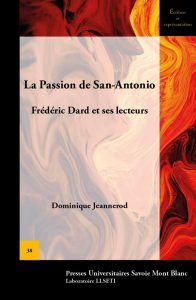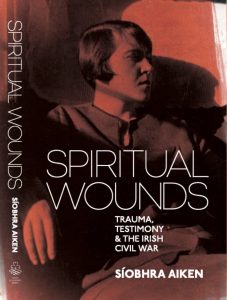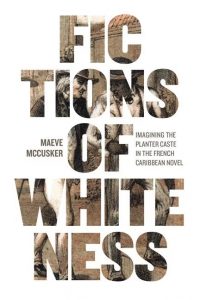This post is part of our Research Initiation Scheme for 2021-2022.
On Friday 20 May 2022, Queen’s University Belfast hosted the annual Modern Languages CDRG Research Showcase. The event emphasised the wealth of research recently undertaken by the Core Disciplinary Research Group at Queen’s. The Celebration of Recent Publications in Modern Languages panel session in particular highlighted some recently published work from three Queen’s lecturers, Dr Dominique Jeannerod (French), Dr Síobhra Aiken (Irish) and Professor Maeve McCusker (French). The panel was chaired by Laura Kennedy, a current PhD student in French.

Dr Dominique Jeannerod, interviewed by Mark O’Rawe, a PhD student in French, provided an overview of his monograph entitled La Passion de San-Antonio: Frédéric Dard et ses lecteurs (Presses universitaires Savoie Mont Blanc, 2021). La Passion de San-Antonio considers the readers of San-Antonio book series by French crime writer, Frédéric Dard. Dr Jeannerod explained how he, like millions of others, grew up in France reading the San-Antonio books. However, these novels were perceived as anti-literature due to a variety of socio-cultural factors, ranging from their aggressive market orientation to Dard’s grotesque humour and idiosyncratic use of French slang. As a result, the San-Antonio books were to be read outside of the classroom. Despite or indeed because of this lack of institutional recognition, the collection of novels has enjoyed a very diverse readership. Dr Jeannerod’s research work on this topic focuses on the relationship between the reader and the author, asking questions about who the readers of San-Antonio are, how they read, and what their assumptions or prejudices might be. In the interview, Dr Jeannerod discussed the varying trends in the San-Antonio readership across generations, which saw the novel’s popularity decrease around the 1990s. The conversation with Dr Jeannerod concluded by looking forward to the return of San-Antonio in multimedia form, with the anticipated release of a TV series, based on the book series.

The second part of the panel session featured an interview with Dr Síobhra Aiken by Masters by Research (MRes) students Katie McNamee and Amber McDaid. Dr Aiken’s monograph Spiritual Wounds: Trauma, Testimony and the Irish Civil War (Irish Academic Press, 2022) explores themes of memory and trauma through the testimonies of both pro- and anti-treaty men and women from the 1920s and 1930s on the Irish Civil War (1922-23). The book is based on Dr Aiken’s PhD research at NUI Galway and was published coming up to the centenary of the Irish Civil War. Dr Aiken discussed the importance of using sources written in both English and Irish in her research, noting that Irish-language sources are diverse and address themes of the body and sex more openly than English-language literature. The testimonies used in Spiritual Wounds derive from a variety of genres, such as news articles, novels, poetry and drama. Dr Aiken explained that fictionalised testimonies outweighed (auto)biographies, and most of this testimony has been neglected in historical study to date. Spiritual Wounds uses these testimonies to reflect on trauma theories and challenge the idea of silence surrounding the Irish Civil War.

The final publication featured in the panel session was Professor Maeve McCusker’s Fictions of Whiteness: Imagining the Planter Caste in the French Caribbean Novel (University of Virginia Press, 2021). Unfortunately, Professor McCusker was unable to attend the session, so the discussion was led by PhD student Margaret Cunningham in her absence. Fictions of Whiteness examines the representation of the béké, the white Creole master, in plantation society by engaging with literary constructions of whiteness in the French Caribbean. Professor McCusker’s research focuses on literature from Martinique and Guadeloupe, detailing how race is entwined with status in the pigmentocracy of these islands. The monograph examines the representation of the béké through the work of a wide range of authors, engaging with both contemporary novelists such as Maryse Condé and Patrick Chamoiseau, and lesser-known nineteenth-century writers such as Louis de Maynard. Margaret Cunningham highlighted the fact that the murder of George Floyd – an event which reanimated the Black Lives Matter movement – occurred while Professor McCusker was finalising Fictions of Whiteness, demonstrating how discourse around race, racism and colonialism explored in postcolonial literary texts is very much relevant to society today.
Each of the three publications featured in this panel session at the Research Showcase 2022 demonstrate the diversity of research carried out by members of the Core Disciplinary Research Group at Queen’s University Belfast. As a final-year French and Spanish student, I feel incredibly grateful to have studied under the guidance of esteemed academics who are contributing such fascinating research to their fields of interest. Attending this seminar has encouraged me to continue studying literature even upon completion of my university studies, exploring texts across differing time periods, geographical locations and languages.
Report by Sarah Henry, final-year undergraduate in French and Spanish